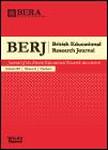版权所有:内蒙古大学图书馆 技术提供:维普资讯• 智图
内蒙古自治区呼和浩特市赛罕区大学西街235号 邮编: 010021

作者机构:Univ Southampton Sch Educ Southampton SO17 1BJ Hants England
出 版 物:《BRITISH EDUCATIONAL RESEARCH JOURNAL》 (英国教育研究杂志)
年 卷 期:2008年第34卷第1期
页 面:37-61页
核心收录:
主 题:Career Education Focus Groups School Districts Guidance Instructional Leadership Students Labor Market Foreign Countries Interviews Data Collection Questionnaires School Orientation Higher Education Socioeconomic StatusUnited KingdomUnited Kingdom General National Vocational Qualif (England)
摘 要:The primary aim of this study, funded by the Department for Education and Skills, was to identify the nature and influence of school-based factors in the choices of young people about their post-16 education, training and career pathways. The study also contributes to the wider understanding of choice , and identifies implications for the development of careers education and guidance and decision-making awareness amongst pupils and students in schools. It also further enhances the modelling of pupil decision making in education and training markets, and in labour markets. The research is based on a series of qualitative interviews in 24 schools across nine local education authorities. Focus groups were undertaken with young people in years 10, 11 and 12. Interviews were also conducted with head teachers, heads of year and heads of careers. A postal survey of parents was also undertaken. Four key school-based factors were found to have a very strong influence in the choices and decisions of young people about their post-16 education, training and career pathways. These were: whether the school had a sixth form or not;the characteristics of school leadership, ethos and values;the socio-economic status (SES) of the schools catchment;and the organisation and delivery of careers education and guidance at the school level. In the main, high SES schools see themselves as developing pupils for academic university careers, while low SES schools maintain a rather stronger commitment to vocational pathways. The academic ethos of schools offers a very powerful influence on post-16 choices and decisions of pupils. The usual interventions put in place to influence choices and decisions appear to have greater impact in schools with a less robust academic vision.